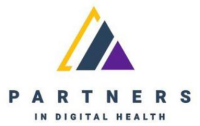
Morning Speakers
8:00 AM – 8:30 AM
Registration & Breakfast
8:30 AM – 8:45 AM
Introduction and Industry Commentary

Tory Cenaj, Founder and Publisher, Partners in Digital Health
8:45 AM – 9:00 AM
Distinguished Keynote
Future Health: Leveraging Space for Health Innovation

James Hury III, Deputy Dir. & Chief Innovation Officer, TRISH
Mr. James Hury, Deputy Director and Chief Innovation Officer for the Translational Research Institute for Space Health (TRISH) explores the future of health, and how preparing technologies to protect the health of astronauts in deep space can advance health for all humans, wherever they explore. Supported by the NASA Human Research Program (HRP), TRISH is an applied space health research catalyst that funds disruptive, high-impact scientific studies and technologies to equip astronauts for deep space exploration. The institute is seeking bold, courageous proposals from experts in disciplines spanning medicine, science, technology, and engineering who have the ideas and skills that will help us find solutions for the challenges and limitations facing human space travel.
9:00 AM - 9:15 AM

Keynote: How Patients Benefit From Broad Use of Blockchain in Healthcare

Mary Butler-Everson, SVP, Commercial Growth, Avaneer Health
Now and in the near future, blockchain improves the lives of patients. Hear how the patient journey transforms with the ability to control their data and critical data is shared seamlessly between stakeholders. With blockchain, healthcare is becoming patient-centered, both clinically and administratively.
Sponsored by
![]()
9:15 AM – 9:30 AM
Implementing Democratized Patient Health Record Access Through Distributed Ledger Technologies and Token Economics

Jim Nasr, CEO, Acoer
This session will delve into a real use case that led to the development of an existing production quality consumer app currently available on both Apple App Store and Google Play. The discussion will be focused on practical considerations, implementation decisions and the nuances of the token economics that were the foundation of this solution.
9:30 AM – 10:00 AM
Walk Before You Run: Why Healthcare Needs Web 2.5 Before It Can Adopt Web3

John Hatchell, Co-Founder and Chief Executive Officer, Tydei.io

Bart Cant, CTO, Tydei.io
In this sessions we’ll discuss
- What elements of blockchain technology can healthcare benefit from TODAY without committing to decentralization
- The strategy for utilizing DAML for the purpose of progressive decentralization in enterprise
- Converging how TradFi was brought on chain to innovate healthcare payments
- Future strategies utilizing DAO’s and NFT’s in a heavily regulated environment
10:00 AM - 10:30 AM

Open DLT for Patient Privacy Protection in the Age of Healthcare Consumerism

Moderator: Maria Palombini, Director, Healthcare & LIfe Science Global Practice Lead, IEEE SA

Sachin Shetty, Associate Director , Virginia Modeling, Analysis and Simulation Center (VMASC), Old Dominion University, and Executive Director of the Center for Secure and Intelligent Critical Systems

Daniel Toshio Harrell, Ph.D., Research Associate, Department of Population Health, Dell Medical School, University of Texas at Austin
Key discussion points of this panel session will include:
- The role of open source DLTs in empowering and protecting patients data
- The role of where technical and data standards are pragmatically needed
- The technical and ethical considerations of patient data governance
Sponsored by

10:30 AM – 10:45 AM
“Hi dear, the doctor is here – where is our EMR wallet?”

Milan Shah, Chief Technology Officer, Biofourmis
Virtual healthcare is positively transforming how healthcare is delivered. As a result, multiple organizations must come together to execute care delivery that’s complicated by challenges with centralized EMR systems in virtual care management. Information management, including storage, sharing, and accessibility, needs to be carefully managed and considered. Blockchain technology is a viable solution to address new challenges created by virtual care.
10:45 AM – 11:00 AM
Shaping the Trajectory of Blockchain in Healthcare

Elissa Prichep, World Economic Forum, World Economic Forum

Chris Moose, Healthcare Partner, Web3 & Blockchain, IBM

Mark Treshock, Executive Director of Emerging Technology, CVS Health
In 2020, 55% of organizations viewed blockchain as a strategic priority. Though blockchain investments and use cases in healthcare are increasing, attention is needed on how this technology will impact patients. This panel will discuss the implications of blockchain for society, its potential to improve healthcare, and the possibilities for shaping a positive future.
11:00 AM – 11:15 AM
Blockchain Technology – Delivering Trust to Global Pharmaceutical Distribution

Dan Purtell, Director of Innovation, British Standards Association
With up to 30% of donated pharmaceutical aid products being diverted, stolen or going to waste in this session we will learn how blockchain technology is addressing some of the biggest trust challenges in the global supply chain. Supply chain issues may prevent people that are in greatest need of life-saving medicines from being treated. Through the use of a Decentralized Knowledge Graph and blockchain technology firms and governmental aid organizations now have visibility to supply chain traceability and transparency of donated medicines. The session will additionally cover ancillary benefits with the implementation of such a solution.
11:15 AM – 11:30 AM
Morning Break
11:30 AM – 11:45 PM
Generic Manufacturers Can Make BIG Changes with Blockchain Technology

Corey Greco, VP, Sales Operations, Armas Pharmaceutials
Blockchain technology has surfaced in the generic pharma arena addressing challenges associated with Contract Management, GPO interactions, and Chargeback adjudication. Manufacturers are now burdened with reducing overhead costs that impact the cost of each unit to get medication to patients safely, effectively, and efficiently. Blockchain technology can be used to enhance efficiencies in how partners interact including inventory management, sales data reporting, chargeback validations and rebate accruals.
11:45 AM – 12:00 PM
Blockchain for Precision Medicine

Robert Chu, Co-Founder & CEO, Embleema
Because evidence generation for precision medicine involves highly complex bioinformatics on human genomic and other molecular data sets, the reproducibility of the evidence generation and the sharing of highly sensitive raw genomic data present major challenges for life sciences sponsors and the FDA. Blockchain offers solutions for reproducibility and privacy assurance in precision medicine.
12:00 PM – 12:30 PM
Lunch
*****Blockchain in Healthcare Today Best Article Award*****
Commercially Successful Blockchain Healthcare Projects: A Scoping Review
Dr. Fang Hao Sen Andrew, Doctors Anywhere, formerly at Sing Health Polyclinics, Singapore
Afternoon Speakers
12:30 PM – 12:45 PM
Three Reasons Why Blockchain Adoption in Healthcare is a Success in Africa and LATAM

Dr. Alex Cahana, MD, Partner, Impct Rooms
The session will ellucidate the economic, regulatory and cultural reasons why decentralized health is so much more successful in EMDE (emerging markets and developing economies) when compared to the US and EU.
12:45 PM – 1:15 PM
Closing a Key Gap in DSCSA Compliance with Credentialing

Bob Celeste, Founder, Center for Supply Chain Studies

David Kessler, President, Legisym, LLC
In this session, the Open Credentialing Initiative (OCI) will introduce the concept and practical application of electronic credentials. Attendees will learn about their use in the context of DSCSA and how they enable timely compliance with the DSCSA Authorized Trading Partner (ATP) requirements.
1:15 PM - 1:45 PM

How Blockchain Transforms Payer Processes to Create a Person-Centered Experience

Moderator:
Gabriela Pelin, Chief Innovation Officer, Avaneer Health

Mark Treshock, Mark Treshock, Executive Director, Emerging Technology, CVS Health

Bob Holzer, Sr. Director Technology Exploration, Health Care Service Corporation
The panel discussion will cover how blockchain enables a more person-centered experience from the beginning of care through payment. With examples from real-world use cases, the discussion will explore how healthcare organizations can better collaborate together using blockchain, co-create workflows and joint processes, and deliver a better experience.
The discussion will answer these questions:
- How are blockchain-enabled solutions more focused on the person?
- What does the network solve that isn’t addressed by other solutions?
- How do your use cases transform the member’s experience?
- What ways can providers and payers collaborate and work together better using blockchain?
Sponsored by:
![]()
1:45 PM – 2:15 PM
Zero Trust: Enabling the Last Mile of Biomedical AI Research

Stephen Dennis, CTO, Softhread

Dr. Bob Rogers, Co-founder and Chief Scientific Officer, BeeKeeperAI
Over 90% of all biomedical AI research is stalled due to its inability to access real world protected health information to complete the required clinical validation and valuation prior to its deployment. With AI forecasted to improve patient outcomes by 40% and costs by 50% the new paradigm of zero trust must be adopted and leveraged to avoid the existential crisis facing biomedical AI research. Join us and learn how confidential computing and blockchain meet the requirements of zero trust.
2:15 PM – 2:45 PM
Standards for a New Healthcare World: Towards Nationwide Patient Access

Jim Markwith, Managing Partner, Markwith Law

Dr. Christophe E. Jackson, Clinical Design Engineer, Gideon
The goal of achieving nationwide patient access is getting closer to reality with the establishment of nationwide electronic healthcare record networks, and with the emergence of TEFCA. Interoperability and privacy standards are critical to achieve efficiency and to provide secure patient access applications. Topics will include current and future developments, including:
- CommonWell Health Alliance
- TEFCA
- Specific Functional Use Cases and Applications
- Blockchain Opportunities
2:45 PM – 3:00 PM
Connecting the Blocks for Physician Credentials

Dr. Ali Loveys, Going Under the Hood of dApps and DAOs, ITPC
Physician credentialing is an arduous and lengthy process resulting in delays in physicians being able to work and generate revenue. In this session we will explore the building blocks to speeding up this process.
3:00 PM – 3:15 PM
Afternoon Break
3:15 PM – 3:30 PM
Leveraging Decentralized Autonomous Organizations in Healthcare to Coordinate Precision Level Patient Care

Dr. Leah Houston, Founder and CEO, HPEC
The healthcare system is expensive, inefficient and frustrating due to unnecessary third parties and friction filled manual processes that get between patients and their doctors. Through decentralized identityby and credentialing we can create a distributed network of practicing doctors that connect connect securely, directly, privately with each other and with the patients they care for. We are building the future essentialized healthcare revolution and we can’t wait to build it with you.
3:30 PM – 4:00 PM
Healthcare Blockchain Quantum Computing Threats and Opportunities

Dr. Renee Bovelle, Owner and Medical Director, Envision Eye & Laser Center

Dr. Robert Campbell, CEO, Med Cyber Security
Highlights of this panel discussion will include:
- The Imminent Quantum Computing threat
- NIST Post-Quantum Solutions
- How Quantum Technologies revolutionize Blockchain Technology and Healthcare
4:00 PM – 4:15 PM
How Blockchain Elevates Health Solutions and Services Today and in the Future

Kyle Culver, Director, Emerging Technologies, Humana, and Co-Founder of the Synaptic Alliance
4:15 PM – 4:45 PM
NFTs and Metaverse in Healthcare: What’s the Big Opportunity?

Radhika Iyengar-Emens, Founding Partner, StarChain Ventures

Daniel Uribe, CEO and Co-Founder, GenoBank.io
The global non-fungible token (NFT) market size is expected to grow by USD 147.24 billion from 2021 to 2026 at a CAGR of 35.27% and According to Precedence Research, the global metaverse market size is projected to be worth around USD 1.6. Trillion by 2030 and expanding growth at a compound annual growth rate (CAGR) of 50.74% from 2022 to 2030.
What does this mean for healthcare and where’s the big opportunity? Although we are in the nascent stage for both NFTs and the Metaverse in healthcare, many will agree that some of the biggest transformations in healthcare will be driven by NFTs, specifically as ownership of data and our health records become the increasing focus in healthcare. Metaverse applications in healthcare also provide an enormous opportunity with many seeing this as the next generation of remote patient care and a new medium for patient engagement. Accenture has called the Metaverse the “next horizon in healthcare”. Immersive metaverse experiences can go beyond patient care and can transform training for doctors, surgeons, and healthcare professionals.
Join a dynamic panel of experts with Alex Liu of RMDS Lab and Daniel Uribe of GenoBank.io and moderator Radhika Iyengar of StarChain Ventures to explore the varied and exciting applications ahead with NFTs and Metaverse including decentralized science (DeSci), decentralized health research, BioNFTs and the future of genome ownership.

Blockchain in Healthcare Today (BHTY) is the world’s first peer reviewed open access journal that amplifies and disseminates distributed ledger technology research and innovations in the healthcare information systems, clinical computing, network technologies and biomedical sciences. Fields of interest include utility for data integrity, privacy preservation, health information systems interoperability, permissioned security for health data, clinical support and clinical trials management, supply chain management, revenue cycle automation, cost and impact, and the integration of AI and machine learning tools in this emerging specialty field of research.
The preeminent international journal is published on a continuous basis to accelerate sharing rigorously vetted theoretical and experiential knowledge required for a global multi-disciplinary ecosystem.

Copyright © 2026. All rights reserved. Designed for ConV2X.